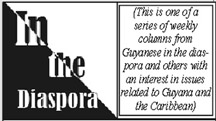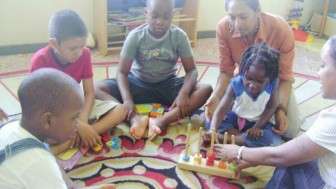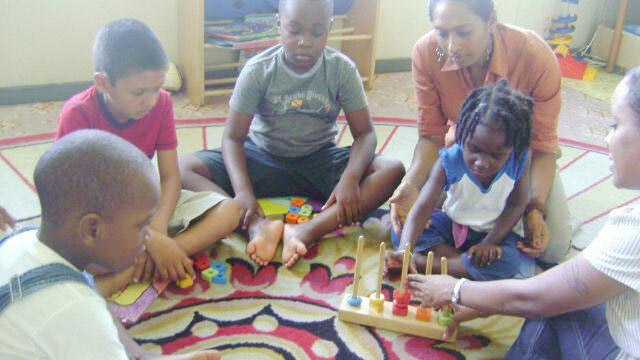By Kala Ramnath and Suraiya Ismail
Dr. Kala (Kay) Ramnath is a mother of two, autism advocate and member of the Board of The Step by Step Foundation. Dr. Suraiya Ismail, a nutrition consultant/educator and the Chair of the Step by Step Foundation, lives and works in Guyana.

What of the situation in Guyana, in relation specifically to autism? In policy terms, there has been to date no coherent national approach to autism in the country and hence little knowledge about what to do if a child exhibits signs of the condition. With the exception of some scattered, general therapies offered by rehab assistants who are trained to be multi-skilled in speech and language and occupational therapy for all kids with disabilities and some limited interventions by the David Rose School and the Ptolemy Reid Rehabilitation Centre, there is nothing consistent that is available specifically for kids and young adults with autism targeting the main deficits of the condition, namely behavioural and communication problems. In relation to speech and language therapy, in a country of just over ¾ million people, there is only one fully qualified speech therapist in the public service. The Rehabilitation Services Division of the Ministry of Health has to rely on a rolling commitment of overseas volunteers – the quality of which can vary hugely, much to the detriment of any coherent strategy to help the kids who need this help most urgently and consistently.
The Ptolemy Reid Rehabilitation Centre (PRRC) in Georgetown is the only facility providing a multi-disciplinary rehabilitation programme for children with physical and developmental disorders, albeit with key limitations. Local expertise in autism is either absent or insufficient. The Ministry of Education has special needs schools and special needs units within mainstream schools in Georgetown, and in Regions 4, 6 and 10. However, the 75 teachers employed in these schools and units are not equipped to deal with the special needs and challenges faced by children with autism spectrum disorders.
In terms of geographical reach, access to the little that is available is another major issue. The PRRC’s efforts to address the special needs of children with autism have limited national impact because many parents cannot afford to travel regularly to Georgetown for behavioural therapy, even if it were available. Add to this the lack of staff training and inadequate space and we can see the problem clearly.
In 2008, when Kay’s husband was posted to Guyana, they were fortunate enough to engage the services of a highly qualified Boston-based behavioural consultant, Dr. James Ellis, who helped to set up their son Rohan’s intensive home teaching using the Applied Behaviour Analysis (ABA) approach. Dr Ellis used his spare time voluntarily to see and advise other parents and, after three years of interacting with and helping these parents and their kids, is now fully-signed up to our work in Guyana. Dr Ellis’ main tasks included the training of our team of behavioural tutors who would go on to form the core of what is now The Step by Step School.
The Step by Step Foundation (SSF), a registered charity, last year established a model school (Step by Step School) in Bagotstown (East Bank Demerara), with trained behavioral tutors to address the needs of children with autism spectrum disorders. The School’s tutors are thoroughly trained in Applied Behaviour Analysis, a system based on thirty years of research and the scientific basis of behaviour and learning. It focuses on teaching skills and making socially valid changes in behaviour that lead to meaningful improvements. A key component of the method is ongoing assessment to ensure that teaching and treatment procedures are consistently and systematically applied and respond to a child’s individual needs.
Each child with autism is different, so the ABA approach is based on assessing and responding systematically to an individual child’s strengths and weaknesses. Each child therefore has baselines set for them (through assessment) as well as goals and targets for learning skills. The basic approach involves rewarding positive behaviour and discouraging negative behaviour (with each task broken down into small steps and practiced regularly) so the child begins to produce behaviour that gains rewards – from verbal praise, to small amounts of food, access to a favourite toy etc.
This approach is then used to teach everything else from numbers to shapes to colours, labeling of objects, animals, household items, food categories to personal hygiene and care and appropriate behaviours in the home, at school and in public places. Requesting for food and toys, going to the toilet, wanting to play, completing a task, all of these are covered systematically in an ABA programme.

Guyana does not have the capacity to adequately diagnose autism. At present we rely on occasional visits from overseas specialists, a service that is available to a very limited number of children. The Step by Step Foundation has established links with key paediatricians in Georgetown who could be trained to diagnose the condition and act as referral doctors for children within Georgetown and elsewhere in Guyana.
While all Guyanese children with physical and developmental disorders are affected by the limited extent of the country’s facilities, the impact on poor families is particularly severe. They cannot afford to seek assistance abroad, nor can they afford even the travel costs to access the existing facilities. Moreover, mothers are unable to seek employment because their children cannot attend school or they cannot afford the specialist home-care needed, leading to even greater poverty.
The Foundation hopes to launch a public awareness campaign to create a better understanding of the needs of children with physical and developmental disorders, to reduce the stigma associated with the disabilities, and to encourage parents to seek appropriate assistance for their children.
Autism strategy therefore demands commitment from central government as it involves investment in all kinds of resources: financial, human and material/infrastructural. It also importantly demands collaboration across ministries, agencies and professionals and public service/private sector and voluntary organizations. As one of the latter, we hope to use our professional expertise to collaborate with and work with the Ministry of Education and the Cyril Potter College of Education, to not only help with training, but also to have a wider reach beyond Georgetown and into the hinterland. We recognize that the Step by Step School can never meet the needs of all children with autism in Guyana. In order to achieve a broader impact, we would like to work with the Ministry of Education to provide training to teachers of children with special educational needs. We could provide training courses, with theoretical sessions at workshops, and practical sessions with children at our school. It’s a win-win approach for the Government of Guyana, the kids and their parents and the Step by Step Foundation in the long run so we should redouble our efforts to make this work.
At a recent stakeholder consultation organized by the Ministry of Education, training of special needs teachers in autism therapy was mentioned. This, and the establishment in Guyana of the internationally-recognized ABA approach by the Step by Step School, places Guyana at the forefront of autism therapy within the Caribbean; as far as we are aware, there is no other school within the Caribbean devoted exclusively to autism spectrum disorders and the use of ABA system.
These initiatives must be nurtured and promoted.
The setting up and running of a foundation and school offering high quality state of the art help to Guyanese children with autism has been a collective labour of love for all of us: executive, parents and donors. However, to achieve our goals and objectives requires urgent and sustained long-term funding and commitment. The Step by Step Foundation has grown and developed with the help of a huge number of Guyanese and non-Guyanese donors too numerous to mention and we are eternally grateful to all of them. They know who they are. We are currently well short of our budgetary demands. If you would like to help us continue to develop and expand our much-needed work in Guyana, here are our details:
Name of Organization: The Step by Step Foundation
Our Bank: Republic Bank Guyana (Main Office)
Address of Bank: 38-40 Water Street, Georgetown, Guyana
SWIFTCODE (for those overseas): RBGLGYGG
Account Number: 651 5761
Postal address/Tel Contact: 4, Ogle Public Road, East Coast Demerara, Guyana (Tel 592 222 2633)
School Address: Lot 3, Bagotstown, EBD, Guyana.
We can be contacted at sjismail@yahoo.co.uk, or stepbystepf@yahoo.com or kalawatie@hotmail.com. Become a friend of Step by Step Guyana on Facebook where you can get updates on all things autism, and info on our activities. Our website will be up soon! (Please forward us your details if you have contributed so that it can be acknowledged).

